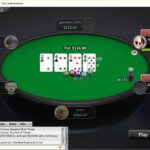“Poker is a game of cards, people and position” – Multiple sources
“There is nothing you can do about the cards” – Multiple sources
Consider that playing cards well will only get you so far if your ultimate goal is to score as many points as possible.
If I’m beating the toughest table of a given limit at 1BB/100 and someone else is beating the softest table of the same limit for 3BB/100 who is the better poker player? Who would you rather be?
“In a game without blinds, the sucker is the first guy to open without the nuts” – Stellar Wind of 2+2
If someone is playing way too many hands, what’s the difference between them and a blind? If your opponents all had to post an extra blind you certainly would be getting the best of it. If I open raise the top 5% of hands and limp lots of crap, might I be better off just posting a blind instead? What if I raise my top 12% of hands, but still play pretty much everything else? How many terrible players play like this? Consider how this might be easily exploitable via plays that would fail miserably against any sound opening strategy if the majority of the other players are mediocre. Consider how these plays affect your image when mediocre players who don’t understand them see them.
If there are 2 suckers at a 9 handed table, how much value is added with a 3rd sucker? 4th sucker? In Hold’em is there a point at which there is no value added or even value subtracted. Malmuth discusses this in one of his Poker Essays. There isn’t an easy answer because it really depends on seating and just how bad they play, but the concept remains.
If the majority of the table is playing somewhat “blind”, the dynamic totally changes in Hold’em. You now need to make stronger hands and show them down. Schooling also becomes a major factor. Jones and Miller’s books address games like this. Many online games 2/4 and up don’t quite fit this mold though. Many players aren’t playing optimally in them because they are trying to exploit suckers that aren’t there.
“Everything else being equal Money at the table flows towards those with position.” – Mike Caro (paraphrased)
Ok, so there are suckers in my game dumping money, where is that money going? Who is getting the bulk of that value? The correct answer is the guy with position on him for all but one hand. Consider that in the SB hand where we don’t have position the sucker will often save him money by open limping. Fail that, he raises and we probably just 3-bet or fold.
In a 3-handed game this dynamic changes. You want the sucker to your left. Yao goes into depth on this in his book (p254-255.)
Fnord’s First Theorem of position:
Being second to last to act isn’t nearly as cool as being last to act.
As last to act, you have the option to take a free card. This can be huge when you’ve picked up a bad flop more multi-way that you would have liked with a hand like 88 as you can just take your 2 outer. Also, when you do bet it’s tougher to put you on a hand because you’re expected to bet.
If you’re second to last to act the button will bet a wide range when checked to and even fairly passive players will try to bluff enough in this spot to cost you money.
Finally, it’s one less chance to get away from a hand due to the action in front of you.
Fnord’s Second Theorem of position:
Having an unpaired Ace on the river out of position sucks.
Can anyone give me a good line here? As best as I can figure this is a tough spot, but one that can be mitigated via seat selection.
Fnord’s Third Theorem of position:
If the player to your left keeps cold calling you in an online game, consider finding a better table.
While he’s probably making big mistakes and you’ll probably make money from him you’re swimming upstream here. With others in the pot his mistake could be costing both of you money! Also, he’s probably going to cold-call a narrower range than he would limp with. If the seats were swapped, you’d be robbing him blind.
Hand values are relative to the action in front of you.
“The real money in Hold’em is won and lost post-flop” – Multiple sources
“There are 6 positions EP, HJ, CO, BN, SB, BB” – Tommy Angelo (paraphrased)
Obvious, but easy to overlook. This is particularly true if you try to play from a chart in late position. What is the +EV range of hands to raise if one player who limps crap but raises his best hands open limps? Two players? Tight blinds? K9s can be a monster. AQo can be toilet paper.
One way to look at Limit Hold’em is as a language with many dialects. The best players figure out the dialects of those around them and act ruthlessly with this information. Ideal play doesn’t beat a game for the max. Exploitation does.
Guys playing lots of full tables
There are lots of these guys online and they play a style that’s almost unique to that environment. They give up small edges to play as many loose tables as possible. What they miss in value they make up in volume. What are they passing up on? They tend to lose some pre-flop balance (easier to put on a range of hands), steal less and defend less. They also respect raises and are less inclined to cold-call, 3-bet light or even get involved in a hand with a good player. When they do try to do these things they often make mistakes due to lack of practice, distractions or incomplete information (wow, he raised A6o, I’m going to give him the maniac treatment.) These guys are perfect to give position to. Interestingly, this kind of play is less common at the B&M as these same players will play out more marginal positions out of sheer boredom (if no other reason.) However, the best multi-tablers are able to do so while leaking less of this value.
The best seat for a tough opponent is across the table.
He will need a stronger hand to play when you raise due to positional respect, won’t be fighting blind wars with you and other action will probably add enough noise to make him a minimal factor. If he’s seated to your right (per conventional wisdom) he will steal your button and your blinds.
Speed online table selection
* Multi-rocks are easy to spot with a fair sample size from other tables/sessions
* Good players tend to exercise good Bankroll Management, hence…
* Anyone with less than 10BB in front of them is extremely suspect
* Anyone that buys in for an amount other than the 25BB default is also suspect. If someone sits down with $126 at a 2/4 game it’s probably all the money in their account.
* Giving position to a player with a very short stack is a non-issue. They will probably go broke soon via picking a pretty starting hand and taking it all the way.
* Anyone in a hand (outside of a blind) is more likely to be the table sucker.
* When in doubt, look elsewhere.
* It’s hard to go too wrong giving the multi-rock position and seeing what develops.
Learning to defend a newbie blind well helps you jump into good games before they dry up and make a good first impression. See Miller’s 2+2 mag articles on this subject (in short, most players don’t raise or 3-bet enough).
Submit your review | |









